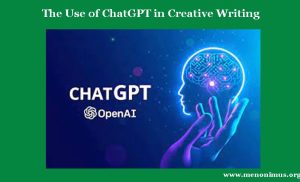The Use of ChatGPT in Creative Writing
The Use of ChatGPT in Creative Writing
The Use of ChatGPT in Creative Writing
Introduction
Creative writing is a dynamic and multifaceted endeavor that requires a writer to craft compelling narratives, develop unique characters, and convey vivid imagery. Throughout history, writers have employed various tools and techniques to aid their creative processes, from typewriters and word processors to notebooks and writing software. In recent years, artificial intelligence (AI) has emerged as a powerful tool for creative writers, with ChatGPT being at the forefront of this technological revolution. This essay explores the use of ChatGPT in creative writing, highlighting its potential to inspire, assist, and transform the way writers approach their craft.
ChatGPT: A Brief Overview
ChatGPT is a product of OpenAI, and it is based on the GPT-3.5 architecture. It is a state-of-the-art natural language processing model that is trained on a massive corpus of text from the internet. ChatGPT is designed to generate human-like text responses to user prompts, making it a versatile and adaptable tool for various applications, including creative writing.
Inspiration and Idea Generation
One of the primary ways ChatGPT aids creative writers is by serving as a source of inspiration and idea generation. Every writer encounters moments of writer’s block or struggles to brainstorm fresh and innovative ideas. ChatGPT can help writers break through these barriers by providing prompts, suggestions, and creative sparks.
Prompt Generation: Writers can input a basic idea or concept into ChatGPT and receive elaborative prompts to kickstart their creative process. For example, if a writer is interested in exploring a dystopian world, ChatGPT can generate prompts like, “In a post-apocalyptic society, people communicate using a unique form of sign language. Describe a day in the life of a protagonist navigating this world.”
Character Development: ChatGPT can also assist in character development by generating character profiles, backstories, and traits. Writers can describe their characters in vague terms and ask ChatGPT to provide more depth, helping to create well-rounded and relatable personas.
Plot Twists and Surprises: Writers can engage with ChatGPT to brainstorm unexpected plot twists or surprising story developments. By introducing unpredictability into their narratives, writers can keep readers engaged and excited.
Assistance with Writing Mechanics
Beyond idea generation, ChatGPT can assist writers with the mechanics of writing, helping to refine their work and improve the overall quality of their creative output.
Grammar and Syntax: ChatGPT can serve as a virtual grammar and syntax checker, providing suggestions to enhance the clarity and fluency of a writer’s prose. It can catch spelling errors, suggest sentence structure improvements, and offer alternatives for word choice.
Style and Tone: ChatGPT can emulate various writing styles and tones, allowing writers to experiment with different voices. This can be especially valuable when working on different genres, from formal academic writing to whimsical fiction.
Editing and Revision: Writers can use ChatGPT as a collaborative editor, seeking feedback on their drafts and receiving suggestions for revisions. ChatGPT can help identify inconsistencies, plot holes, or areas in need of further development.
Exploration of Language and Genre
ChatGPT’s ability to work with a vast database of text enables writers to explore different languages, genres, and cultural nuances, expanding their horizons and enriching their writing.
Multilingual Writing: Writers can engage with ChatGPT in various languages, allowing them to write in languages they may not be fully fluent in. This opens up new possibilities for international storytelling and reaching diverse audiences.
Genre Exploration: ChatGPT can assist writers in exploring unfamiliar genres and subgenres. For example, if a mystery writer wishes to delve into the realm of science fiction, ChatGPT can provide insights and suggestions to blend these genres effectively.
Ethical Considerations and Challenges
While ChatGPT offers numerous benefits to creative writers, its use also presents ethical considerations and challenges that should be addressed:
Plagiarism and Originality: There is a risk that writers may rely too heavily on ChatGPT and produce work that lacks originality. Writers must balance their use of AI tools with their creative input to maintain the uniqueness of their writing.
Data Bias: ChatGPT is trained on a vast dataset from the internet, which may contain biases and problematic content. Writers must be aware of these biases and strive to create inclusive and responsible content.
Intellectual Property: Questions about ownership and copyright may arise when AI-generated content is used in creative writing. Clear guidelines and agreements should be established to address these issues.
Conclusion
The use of ChatGPT in creative writing is a promising and transformative development in the world of literature and storytelling. It provides writers with valuable tools for idea generation, writing mechanics, language exploration, and genre experimentation. However, it also raises ethical concerns that must be carefully considered. Ultimately, ChatGPT’s role in creative writing is that of an invaluable assistant, complementing the creative process rather than replacing it. As writers continue to harness the power of AI, they must strike a balance between the benefits of automation and the preservation of their unique creative voices. With responsible and thoughtful use, ChatGPT can be a driving force in expanding the boundaries of creativity in the world of literature. 0 0 0.
You May Like:











